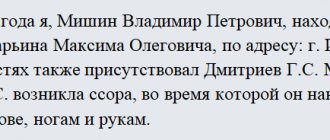First, it should be noted that the share of this category of cases among all other criminal cases is not significant and amounts to about 7%...
The share of criminal cases in courts...
With the advent of the new Criminal Procedure Code of Ukraine, a new section of crimes appeared - crimes in the form of private prosecution.
The concept of this is contained in Art. 477 of the Code of Criminal Procedure – “proceedings in the form of a private prosecution are proceedings that can be initiated by an investigator or prosecutor only on the basis of a statement from the victim.”
Part 4 Art. 26 of the Code of Criminal Procedure of Ukraine provides that the investigation begins only with the filing of a statement by the victim or his legal representative.
According to Article 478 of the Code of Criminal Procedure of Ukraine, the victim has the right to submit to the investigator, prosecutor, or other official of the body authorized to initiate the pre-trial investigation, a statement about the commission of a crime during the statute of limitations for bringing to criminal responsibility for committing a certain crime.
A private prosecution complaint is filed in the prescribed form, in compliance with the requirements of the Code of Criminal Procedure and record keeping. It should contain: Full name. applicant, address, telephone number, a brief summary of the circumstances of the incident, possible witnesses, number and signature of the author.
Sample crime report
If you encounter unlawful behavior by an investigator:
In cases where the victim “resolved” the issue with the offender, and an application for “revocation” was filed, this is an unconditional basis for closing criminal proceedings.
You might be interested in:
Lawyer's blog
State Bureau of Investigation (SBI): for or against
Read more
Lawyer's blog
Conflict of interest in the legal profession
Read more
Lawyer's blog
What happens to a trademark after the liquidation of a company?
Read more
Lawyer's blog
Emphyteusis agreement as an alternative to the land purchase and sale agreement
Read more
Lawyer's blog
Deviation from the principle of proportionality of distribution of legal costs
Read more
Lawyer's blog
Secrets of criminal lawyers
Read more
The specifics of such proceedings are contained in Chapter 36 of the Code of Criminal Procedure of Ukraine.
In what cases can a criminal case be initiated?
The law provides an exhaustive list of reasons and grounds for initiating a criminal case:
- statements from citizens and representatives of organizations about a criminal act;
- resolution of the prosecutor's office;
- surrender of a citizen;
- a message about an impending or completed criminal act received from other sources.
The investigator (inquiry officer) reviews the submitted materials and messages. Based on the results of the consideration, one of the following decisions is made:
- refusal to initiate proceedings;
- on the transfer of information and materials under jurisdiction;
- to initiate a criminal case.
Private and public prosecution, its nature and characteristics, as well as the role of the prosecutor’s office in each of them.
The prosecutor's support of a private prosecution is an additional legal guarantee of the rights of the victim.
Let's look at a specific case as an example: the local court did not allow the prosecutor of the local prosecutor's office to take part in the case; he exercised procedural leadership in criminal proceedings.
The case reached the Supreme Court. Which noted in this an exceptional legal problem, with the subsequent transfer of the case to the Grand Chamber of the Supreme Court for the need to resolve the following issues:
1) Does the participation of the prosecutor in the trial of criminal proceedings in the form of private prosecution relate to the functions of maintaining public prosecution?
2) Includes the concept of “public prosecution” of proceedings in the form of private prosecution, taking into account the provisions of Articles 129, 131-1 of the Constitution of Ukraine, Part 4, Article 26, Part 5, Article 340, Article 477 of the Code of Criminal Procedure of Ukraine?
3) Is the mandatory participation of the prosecutor during the judicial review of such proceedings in the form of a private prosecution, taking into account the procedural guarantees of the parties to the proceedings, defined in Article 22 of the Code of Criminal Procedure of Ukraine?
Broken down by composition
The Constitutional Court returns to the case of police major from Maryina Roshcha Anna Tikhomolova for the second time. In 2015, defendants in one of the cases led by Tikhomolova accused her of beatings. While the trial was ongoing, Article 116 of the Criminal Code of the Russian Federation was decriminalized, and the court dismissed the case against Tikhomolova for lack of corpus delicti. But the police officer insisted on an acquittal because the accusation of the “black raiders” was false - and reached the highest legal authority in the country. In 2021, the Constitutional Court prohibited the termination of private prosecution cases without the consent of the accused. The case of Major Tikhomolova was sent for a new trial and again dismissed, this time due to the failure of the private prosecutor to appear without good reason, but again due to the lack of corpus delicti in the act. While Anna herself insists that there was not just a crime, but an event of a crime, that is, she did not beat anyone.
“During the trial, it was proven that I was persecuted for more than five years by a group of people, one of whom has now been convicted,” Tikhomolova pointed out. “My constitutional rights were violated, while at the same time the false accuser and the same witness remained unpunished.
The Constitutional Court stated that the Code of Criminal Procedure of the Russian Federation distinguishes between the absence of a crime and the absence of corpus delicti in an act: the first is completely exculpatory, the second does not exclude the occurrence of negative consequences, bringing the person involved to administrative or material liability. Therefore, it would be wrong to equate these grounds for termination of criminal prosecution.
The Code of Criminal Procedure of the Russian Federation distinguishes between the absence of a crime event and the absence of corpus delicti in an act
The judge also drew attention to the special nature of private prosecution cases: the victim’s statement is essentially an indictment, but it can be abandoned at any stage, including by simply failing to appear at the trial. In this case, the court is obliged to terminate the consideration of the case, since it is not a criminal prosecution body and does not act on the side of the prosecution or defense - and some “understatement” remains in the case.
The provisions of part one of Article 24 of the Criminal Procedure Code, in conjunction with other articles of this code regulating the termination of a criminal case or criminal prosecution, were recognized as inconsistent with the Constitution. The legislator is instructed to eliminate the discrepancy, and until changes are made to the current legislation, the court is obliged to interpret the failure of a private prosecutor to interpret it as the absence of corpus delicti in the act. Tikhomolova's case will be reviewed.
What was established by the relevant decision
Articles 129, 131-1 of the Constitution of Ukraine provide that the constitutional function of the prosecutor and the basis of legal proceedings is the prosecutor’s maintenance of public charges in court.
UP legislation operates with the concept of “state prosecution”, which, in accordance with clause 3, part 1, art. 3 of the Code of Criminal Procedure of Ukraine, is the procedural activity of the prosecutor, which consists of proving charges before the court in order to ensure criminal liability of the person who committed the crime.
Art. 2 of the Law of Ukraine “On the Prosecutor’s Office”, among the functions of the prosecutor’s office, determines the maintenance of state prosecution in court.
So , the terminology of the Constitution of Ukraine and sectoral criminal procedural legislation differs in the definition of such a function of the prosecutor’s office as maintaining charges in court.
However, the protection of the interests of the individual and society that suffered during the commission of an offense is determined by Art. 2 of the Code of Criminal Procedure of Ukraine as a task of criminal proceedings, is the main goal of the activities of the prosecutor’s office, which is enshrined in the Constitution of Ukraine as maintaining public prosecution in court.
There is a terminological conflict in terms of the constitutional, legal and sectoral definition of the function of the prosecutor's office, which can be explained by the harmonization of the constitutional and legal regulation of the functioning of the prosecutor's office with the relevant international standards.
Article 318 of the Code of Criminal Procedure of the Russian Federation. Initiation of a criminal case of private prosecution (current version)
1. Criminal cases for crimes specified in part two of Article 20 of this Code are initiated against a specific person by filing an application to the court by the victim or his legal representative, except for the cases provided for in paragraph 2 of part one and part four of Article 147 of this Code.
2. In the event of the death of the victim, a criminal case is initiated by filing an application by his close relative or in the manner established by part three of this article.
3. A criminal case is initiated by an investigator, as well as, with the consent of the prosecutor, by an inquiry officer in the cases provided for in part four of Article 20 of this Code. In this case, the investigator begins the preliminary investigation, and the interrogator begins the inquiry.
4. The entry of a prosecutor into a criminal case does not deprive the parties of the right to reconciliation.
5. The application must contain:
1) the name of the court to which it is filed;
2) a description of the crime event, place, time, as well as the circumstances of its commission;
3) a request addressed to the court to accept the criminal case for proceedings;
3.1) information about the victim, as well as documents proving his identity;
4) information about the person brought to criminal liability;
5) a list of witnesses who must be summoned to court;
6) signature of the person who submitted it.
6. The application is submitted to the court with copies according to the number of persons against whom a criminal case of private prosecution is being initiated. The applicant is warned of criminal liability for knowingly false denunciation in accordance with Article 306 of the Criminal Code of the Russian Federation, about which a note is made in the application, which is certified by the signature of the applicant. At the same time, the magistrate explains to the applicant his right to reconciliation with the person against whom the application was filed.
7. From the moment the court accepts the application for its proceedings, on which a decision is made, the person who filed it is a private prosecutor. The rights provided for in Articles 42 and 43 of this Code must be explained to him, about which a protocol is drawn up, signed by the judge and the person who filed the application.
8. If, after accepting the application for proceedings, it is established that the victim, due to a dependent or helpless state or for other reasons, cannot defend his rights and legitimate interests, then the magistrate has the right to recognize the participation in the case of the legal representative of the victim and the prosecutor as mandatory.
Why eliminating the institution of private prosecution will not protect victims of domestic violence
This month, the Supreme Court presented for review a bill to abolish the institution of private prosecution in criminal proceedings, which is currently applied to offenses such as unqualified libel, battery by a person subject to administrative punishment, and causing minor harm to health without aggravating circumstances. This procedure assumes that, as a general rule, the victim can independently act as a private prosecutor in a case in court, as well as voluntarily renounce the accusation or reconcile with the offender.
The draft changes developed by the highest judicial body assume that the prosecution for such crimes will become private-public, that is, once filing a statement of crime, the victim will not be able to stop the mechanism of persecution of his ill-wisher, and the prosecution in such cases will be purely professional.
Some human rights activists are celebrating the victory. In their opinion, now any case of domestic violence will be brought to its logical conclusion and fair punishment of the aggressor, and law enforcement officers will no longer persuade the injured party to withdraw the statement.
However, from the perspective of criminal lawyers, if the bill is adopted, such a victory will be a Pyrrhic one, and there are quite good reasons for this.
The fact is that law enforcement agencies strive to generate departmental statistics exclusively from potentially solved cases, when the formation of an evidence base does not require much effort. As practice shows, in the case of domestic violence, which is intra-family and highly latent (hidden) in nature, collecting evidence will be significantly difficult for them. In addition, the potential episodicity, irregularity and heterogeneity of aggressive actions by the abuser (today he intimidated, another time he caused bodily harm) will serve as an additional demotivator for law enforcement officers. The passage of procedural deadlines for the investigation, coupled with increasing episodes of domestic violence and emerging difficulties at the stage of collecting evidence, increases the risk of turning the case into a potential hang-up.
However, the personal prejudice of law enforcement officials that the victim is often “to blame” can become a significant stumbling block already at the stage of filing an application. Contrary to the provisions of the procedural law, instead of issuing a coupon for accepting the victim’s application, employees of the nearest district police department will complain that applications are accepted “only on Mondays”, will assure that there is no prospect of filing it, and finally will give “friendly advice” to deal with family problems on your own and do not wash dirty linen in public.
It is from this perspective that one should read the explanatory note of the Supreme Court of the Russian Federation to the bill, which states that cases “for which there is no preliminary confirmation of the existence of the event and the elements of the relevant crime” will not go to the courts. After all, in fact, it is precisely this position, if the bill is adopted, that will be broadcast by police officers at the time of filing a statement and during the subsequent investigation of the case. At the same time, informal circumstances will always be sufficient for law enforcement officers to terminate it due to the absence of an event or corpus delicti, based on established practice.
Also symbolic is the very fact that the state excludes the possibility of the victim refusing accusations and reconciling with the aggressor. For the developers of the bill, these changes are organically combined with the absence of any protective measures in relation to the injured party. In most cases, in practice, this means that the criminal prosecution of the application will continue, but the victim, not having the physical ability to distance himself from the aggressor, will continue to live with him under the same roof, remain involved in the everyday environment and general social connections.
The above circumstances directly indicate that the initiative of the Supreme Court of the Russian Federation is actually aimed at reducing the level of access to justice for victims of domestic violence and creates the risk of insurmountable red tape in criminal cases of this category.
Currently, the active work of victim advocates allows for the efficient collection of evidence and the achievement of a conviction without the need to deal with “police discretion.” If the bill is approved, the injured party will be forced to go through all the bureaucratic obstacles at the level of the police department in the area of their residence, instead of the current procedure for the unconditional acceptance of consideration of such applications by the court.
In addition, if the Supreme Court had serious intentions to protect the interests of victims of domestic violence, then its attention would be focused on a system of protective measures and protecting the vulnerable category from unwanted contacts with the abuser during the investigation period. Obviously, this would require systemic legislative changes in the field of protecting victims from crimes in general and an internal restructuring of the work of law enforcement agencies, and, probably most importantly, a revolution in legal consciousness at the level of a specific police officer in the district department. As I see it, in this case, officials from the Supreme Court would not have been able to introduce the bill for consideration with the stamp “will not entail additional expenses from the federal budget.”



